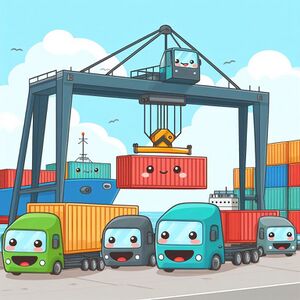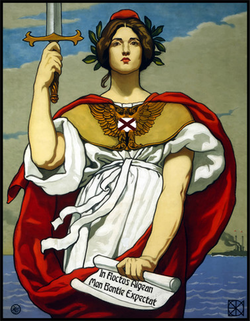Ganty and Company: Difference between revisions
Tags: Mobile edit Mobile web edit Advanced mobile edit |
m minor intro formatting |
||
| Line 53: | Line 53: | ||
}} | }} | ||
''Ganty and Company'' | '''''Ganty and Company''''' is a [[Burgundie|Burgoignesc]] children's television series created by Rev. Rachet-Michel Olan d'Ouestvil. The show centers around Ganty, an anthropomorphized gantry crane, and his assorted companions, which include sentient shipping containers, trucks, and ships in port city of Orville. Across its seven seasons, the show meticulously explores the intricacies of container port operations, infusing educational content with an entertaining narrative. The series officially premiered on [DATE] and has aired 7 seasons. | ||
Each episode, is a concise 10-minutes long, ensuring an engaging yet digestible viewing experience for its young audience. The storytelling revolves around the collaborative efforts of Ganty and his companions, emphasizing the importance of teamwork, logistical efficiency, and problem-solving in the context of port logistics. The series provides specific insights into container handling, transportation processes, and maritime activities, fostering a nuanced understanding of these concepts among its viewers. | Each episode, is a concise 10-minutes long, ensuring an engaging yet digestible viewing experience for its young audience. The storytelling revolves around the collaborative efforts of Ganty and his companions, emphasizing the importance of teamwork, logistical efficiency, and problem-solving in the context of port logistics. The series provides specific insights into container handling, transportation processes, and maritime activities, fostering a nuanced understanding of these concepts among its viewers. Notably, the writers of "Ganty and Company" steer clear of idealistic portrayals, opting instead for a realistic depiction of the challenges faced in the bustling port environment. The show maintains a balance between educational content and entertainment, presenting technical aspects in a manner that is accessible and engaging for its target audience, 5-12yr olds. As viewers follow the adventures of Ganty and his friends, they gain a practical understanding of the intricate world of container shipping, making "Ganty and Company" a valuable and informative addition to children's programming. | ||
The show is enormously popular in Burgundie and has spawned numerous merchandise, toys, video games, and other media. Ganty and Company has won a variety of awards including 6 [[Opus Awards#Opus Television Awards|Opus Television Awards]], 4 Youth Media Awards, 2 Opus Children's Awards, and a record-breaking 8 Levantine Kids Choice Awards. | |||
==History== | ==History== | ||
Revision as of 23:04, 21 November 2023
| Ganty and Company | |
|---|---|
 Gantry and Company | |
| Genre | Children's television series |
| Created by | Rev. Rachet-Michel Olan d'Ouestvil |
| Country of origin | |
| Original language | Burgoignesc |
| No. of series | 7 |
| No. of episodes | 98 |
Ganty and Company is a Burgoignesc children's television series created by Rev. Rachet-Michel Olan d'Ouestvil. The show centers around Ganty, an anthropomorphized gantry crane, and his assorted companions, which include sentient shipping containers, trucks, and ships in port city of Orville. Across its seven seasons, the show meticulously explores the intricacies of container port operations, infusing educational content with an entertaining narrative. The series officially premiered on [DATE] and has aired 7 seasons.
Each episode, is a concise 10-minutes long, ensuring an engaging yet digestible viewing experience for its young audience. The storytelling revolves around the collaborative efforts of Ganty and his companions, emphasizing the importance of teamwork, logistical efficiency, and problem-solving in the context of port logistics. The series provides specific insights into container handling, transportation processes, and maritime activities, fostering a nuanced understanding of these concepts among its viewers. Notably, the writers of "Ganty and Company" steer clear of idealistic portrayals, opting instead for a realistic depiction of the challenges faced in the bustling port environment. The show maintains a balance between educational content and entertainment, presenting technical aspects in a manner that is accessible and engaging for its target audience, 5-12yr olds. As viewers follow the adventures of Ganty and his friends, they gain a practical understanding of the intricate world of container shipping, making "Ganty and Company" a valuable and informative addition to children's programming.
The show is enormously popular in Burgundie and has spawned numerous merchandise, toys, video games, and other media. Ganty and Company has won a variety of awards including 6 Opus Television Awards, 4 Youth Media Awards, 2 Opus Children's Awards, and a record-breaking 8 Levantine Kids Choice Awards.
History
| This article is part of a series on the |
| Culture in Burgundie |
|---|
 |
| Society |
| Arts and literature |
| Other |
|
Burgundie portal |
Ganty and Company stems from a deliberate fusion of educational objectives and creative storytelling developed the PR firm working for the Burgoignesc South Levantine Trading Company and the Ministries of Trade and Education of the Government of Equatorial Ostiecia. The conceptualization of the series emerged through collaborative efforts between content creators, educators, and industry experts, all aiming to bridge the gap between entertainment and informative programming for young minds.
The government of Equatorial Ostiecia funded the project with a $200,000 grant that allowed the assembled to meticulous research into the operational dynamics of container ports, drawing inspiration from real-world logistics and maritime activities. Industry professionals, including engineers and logistics specialists from companies like O'Shea Operation Management Services, the Burgoignesc South Levantine Trading Company, and O’Shea Container Shipping, were consulted to ensure a nuanced and accurate portrayal of the subject matter. The decision to focus on an anthropomorphized gantry crane, Ganty, and his diverse ensemble of sentient shipping containers, trucks, and ships, was a strategic choice to personify key elements of the port environment and make the content relatable to young children.
The narrative arc and thematic elements were crafted with a pragmatic approach, eschewing idealism in favor of grounded storytelling. The episodic structure, with each episode lasting precisely 10 minutes, was designed to cater to the attention span of young viewers while delivering substantive content.
Main characters
| Portrait | Equipment type | Role/main characteristics | # of episodes | |
|---|---|---|---|---|
| Ganty the Gantry Crane | 
|
Gantry crane | Protagonist
|
98 |
| Carol the Container ship | 
|
Container ship | Protagonist's sidekick
|
92 |
| Philippe the Flatbed | 
|
Flatbed truck | Antagonist
|
96 |
| Todrick the Tug | 
|
Tugboat | Protagonist's sidekick
|
75 |
Ganty
Gantry, the central character in "Ganty and Company," is inherently helpful, displaying a keen sense of assistance and support for his friends in the bustling container port of Orville. His helpful nature serves as a foundational element, driving collaborative problem-solving and emphasizing the importance of mutual aid.
Empathy is a key facet of Gantry's personality, contributing to the series' emphasis on understanding and cooperation. Gantry's ability to relate to the experiences and challenges of his companions fosters a sense of camaraderie, reinforcing the overarching theme of community within the port environment.
Efficiency is a hallmark of Gantry's approach to tasks, aligning with the Protestant work ethic subtly woven into the show. Gantry's commitment to completing tasks promptly and effectively serves as a model for industriousness, reinforcing positive work habits for the young audience. His efficiency contributes to the portrayal of the container port as a well-coordinated and smoothly operating environment.
Gantry's character is marked by a one-track mind, indicative of his focused dedication to his responsibilities. This singular dedication adds a layer of predictability to his actions, emphasizing the reliability of his character within the dynamic port setting. While not inherently creative or innovative, Gantry's consistent approach and reliability contribute to the stability of the group dynamic, highlighting the importance of each character's unique strengths.
Carol
Carol the Container Ship is Ganty's trusty sidekick in "Ganty and Company." Industrious by nature, Carol embodies a strong work ethic, reflecting the show's underlying themes of diligence and commitment. Her role as a container ship is characterized by efficiency and reliability, aligning seamlessly with the operational demands of the bustling port.
Innovation is a defining aspect of Carol's personality, setting her apart within the cast. Despite being a traditionalist, she embraces new and efficient approaches to maritime operations, showcasing a forward-thinking attitude. This innovative spirit serves as a source of inspiration for the young audience, subtly encouraging an appreciation for adaptive problem-solving and technological advancements in the context of shipping and logistics.
Despite her innovative nature, Carol retains a sense of tradition, adding depth to her character. This traditionalist aspect is manifested in her adherence to established maritime practices and a respect for the historical roots of her profession. Through Carol, the show pays homage to the rich history of seafaring and container shipping in Burgundie, imparting a sense of continuity and tradition in the midst of evolving technologies.
Pride, a notable characteristic of Carol, is woven into her interactions and contributions to the group dynamic. Her pride in her role as a container ship serves as a motivating factor, instilling a sense of purpose and responsibility among the characters. However, the narrative delicately navigates the potential pitfalls of excessive pride, using it as a tool for character development and emphasizing the importance of humility within a collaborative environment.
Philippe
Philippe, the Flatbed, is the antagonist in "Ganty and Company,". He is characterized by a unique blend of traits that contribute to both conflict and cooperation within the bustling port of Orville.
Philippe's pushy nature forms a central aspect of his character, creating tension and challenges for the ensemble. His assertiveness often clashes with the more collaborative and considerate approach of Ganty and the other characters, serving as a source of conflict that propels the storyline forward. This pushy demeanor adds an element of unpredictability, injecting a degree of tension into the group dynamics.
Despite his pushiness, Philippe demonstrates a surprising efficiency in accomplishing tasks, underscoring his role as a team player within the port environment. His quick execution of assignments contributes to the operational rhythm of the show, showcasing the importance of diverse working styles within a collaborative setting. However, this efficiency is not always aligned with Ganty's goals, creating a nuanced dynamic that adds depth to the narrative.
Philippe's self-centered tendencies introduce a layer of complexity to his character. His focus on personal goals occasionally disrupts the harmony of the port community, emphasizing the need for balance between individual aspirations and collective well-being. This self-centered aspect of Philippe's character serves as a catalyst for character development and moral lessons within the series.
Todrick
Todrick the Tugboat emerges as a vital but underappreciated asset in "Ganty and Company". His helpful nature is a defining characteristic, embodying a sense of reliability and support for his companions within the bustling port of Orville. Todrick's willingness to assist, often behind the scenes, becomes a linchpin for the smooth functioning of the Port of Orville.
Possessing notable strength, Todrick serves as a enduring powerhouse within their little world. His towing capabilities and resilience underscore the physical demands of port operations, portraying the essential role of tugboats in navigating and maneuvering larger vessels. Despite the inherent strength, Todrick's contribution is underappreciated, shedding light on the often overlooked roles within the port infrastructure.
The theme of underappreciation becomes a central element in Todrick's character arc. Despite his indispensable role, Todrick's efforts are not always acknowledged, reflecting the show's commitment to exploring the dynamics of recognition and gratitude within a collaborative environment, but also the concept that good work does not need to be accompanied by pridefulness. This narrative choice serves as a subtle lesson for the audience, emphasizing the importance of acknowledging the contributions of all team members, regardless of their visibility.
Themes
Although rooted in the perspective of its Congregationalist minister creator, the show writers adeptly weaves themes that transcend denominational boundaries, ensuring resonance with a diverse audience in the Burgoignesc Metropole and Yonderre, which are primarily Catholic, and parts of the Burgoignesc thalattocracy in Audonia they are primarily Muslim. The series subtly incorporates elements of Congregationalism and the Protestant work ethic while tactfully toning down doctrinal specifics for broader appeal.
At its core, the Protestant work ethic manifests through the characters' commitment to industriousness, responsibility, and collaborative effort within the bustling port environment of Orville. Ganty, as the central figure, embodies the virtue of diligence, symbolizing the idea that purposeful work is both fulfilling and essential. This theme is seamlessly integrated into the narrative, offering young viewers a positive perspective on the value of effort and cooperation.
The series also espouses principles of community and mutual support, aligning with Congregationalist values. Through the interactions of Ganty and his diverse group of friends, the importance of teamwork, understanding, and unity becomes a recurrent motif. The show thus promotes a sense of communal responsibility, echoing Congregational ideals in a way that transcends specific religious denominations.
Crucially, the themes are presented with a measured tone, avoiding explicit religious dogma to cater to the broader, predominantly Catholic and Muslim audience. The emphasis is on universal virtues and values that resonate across religious affiliations, fostering inclusivity and a shared understanding of positive moral principles.
In navigating this delicate balance, "Ganty and Company" successfully imparts moral lessons and work ethic values without imposing specific religious doctrines. By doing so, the series emerges as a culturally sensitive and enriching experience for its viewers across the Burgoignesc thalattocracy, where diverse religious backgrounds are respected while common ethical threads are celebrated.